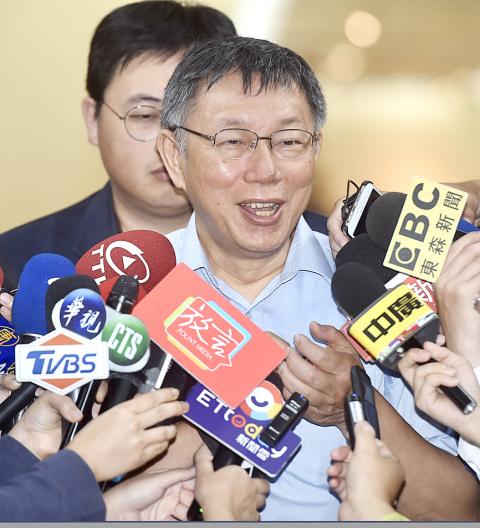Taipei Mayor Ko Wen-je (柯文哲) yesterday said that he would listen first to what other presidential aspirants have to say, but would also start thinking seriously about his next step.
Ko made the comments after the Chinese Nationalist Party (KMT) yesterday morning announced that Kaohsiung Mayor Han Kuo-yu (韓國瑜) has won its presidential primary.
An independent who is widely believed to be eyeing the nation’s top office, Ko has frequently been asked when he would make a decision to run or whether he would team up with a political party.

Photo: Chien Jung-fong, Taipei Times
Last week, he said that he still has time to ponder over the issue, as the last day for presidential candidate registration is on Sept 17. The election is to be held on Jan. 11 next year.
Asked whether Han’s victory would affect his decision to run for president, Ko said: “I have not really thought about it, but now I will have to seriously think about it.”
He said his background as an emergency room surgeon has taught him that he must first check a patient’s condition, before deciding on the proper surgical procedure, so he would answer the question when he has finished thinking about it.
For starters, he wanted to hear first what other KMT presidential aspirants have to say about the primary results, then decide how to respond to the situation, Ko said.
“Taiwan’s general interest, the people’s maximum well-being, the long-term development of Taiwan ... we have to start thinking about these as events occur,” he said.
“As rational human beings, we can make rational predictions, so people have to starting thinking about what would happen if President Tsai Ing-wen (蔡英文) continues as president or if they choose Han,” Ko said, adding that people have to think about whether the information the candidates provide is reasonable.
“I have never held a parochial point of view,” Ko said. “Politics should be a pragmatic part of people’s everyday lives; politics must be executable. Chanting slogans is useless, because ideas must be executable.”
“The problem with Taiwan now is we have too many slogans, but are lacking in procedures to execute them,” he said.
When people keep on talking about sovereignty and national consciousness, but government efficiency in implementing the budget is only 66 percent, then the policy plans are all a sham, because they cannot be executed, he added.

Taipei has once again made it to the top 100 in Oxford Economics’ Global Cities Index 2025 report, moving up five places from last year to 60. The annual index, which was published last month, evaluated 1,000 of the most populated metropolises based on five indices — economics, human capital, quality of life, environment and governance. New York maintained its top spot this year, placing first in the economics index thanks to the strength of its vibrant financial industry and economic stability. Taipei ranked 263rd in economics, 44th in human capital, 15th in quality of life, 284th for environment and 75th in governance,

The Sports Administration yesterday demanded an apology from the national table tennis association for barring 17-year-old Yeh Yi-tian (葉伊恬) from competing in the upcoming World Table Tennis (WTT) United States Smash tournament in Las Vegas this July. The sports agency said in a statement that the Chinese Taipei Table Tennis Association (CTTTA) must explain to the public why it withdrew Yeh from the WTT tournament in Las Vegas. The sports agency said it contacted the association to express its disapproval of the decision-making process after receiving a complaint from Yeh’s coach, Chuang

Control Yuan Secretary-General Lee Chun-yi (李俊俋) tendered his resignation last night, admitting that he had misused a government vehicle, as reported by media. His resignation was immediately accepted by the Control Yuan. In a statement explaining why he had resigned, Lee apologized for using a Control Yuan vehicle to transport his dog to a pet grooming salon on May 20. The issue first came to light late last month, when TVBS News reported that Lee had instructed his driver to take the dog to the salon. The news channel broadcast photos that it said were taken by an unnamed whistle-blower, which purportedly showed the

A former officer in China’s People’s Liberation Army (PLA) who witnessed the aftermath of the 1989 Tiananmen Square massacre has warned that Taiwan could face a similar fate if China attempts to unify the country by force. Li Xiaoming (李曉明), who was deployed to Beijing as a junior officer during the crackdown, said Taiwanese people should study the massacre carefully, because it offers a glimpse of what Beijing is willing to do to suppress dissent. “What happened in Tiananmen Square could happen in Taiwan too,” Li told CNA in a May 22 interview, ahead of the massacre’s 36th anniversary. “If Taiwanese students or